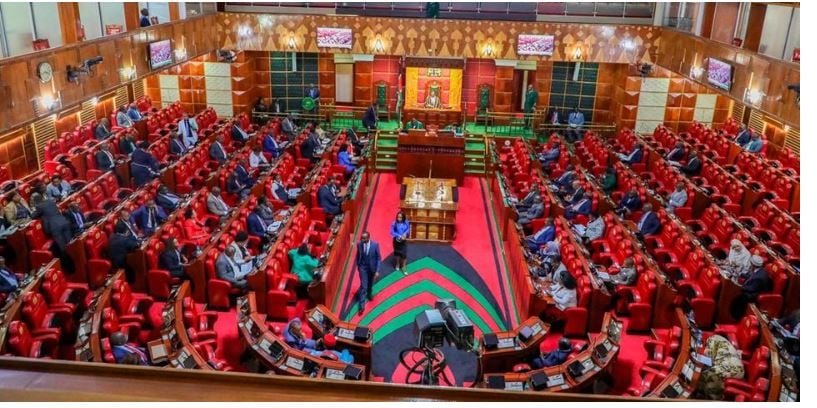[ad_1]
Economy
State reveals plan to hand struggling millers to private investors
Wednesday August 23 2023
Members of the National Assembly during a sitting . FILE PHOTO | DENNIS ONSONGO | NMG
More than Sh117 billion debts owed by five struggling State sugar companies will be written off by the government before they can be leased to private investors if Parliament approves a plan by the Treasury.
The plan will also see run-down factories sold and land leased to the bidders picked to commercially run Nzoia Sugar, South Nyanza Sugar (SONY), Chemelil Sugar, Mumias Sugar, Muhoroni Sugar and Miwani Sugar to construct modern plants.
Treasury Cabinet Secretary Njuguna Ndungú said that the proposed lease model shall be executed by unbundling the nucleus estate land and the factory lands owned by the millers.
Read: Sugar woes to persist as cane shortage hits millers
“In this case, it makes it possible for the factory to be run by the private sector without permanently divesting the nucleus estate hence meeting the stakeholder and community concerns,” Prof Ndung’u said in a memo to Parliament tabled on Tuesday.
This comes weeks after the Cabinet dropped an earlier plan to privatise the firms following sustained opposition by leaders and sugarcane farmers from the sugar-belt region.
Under the proposed leasing model, the Treasury will allow the private sector participation without undertaking a permanent divestiture.
“The benefits of leasing will be to enhance the livelihoods of farmers, employees and communities and make sugar farming profitable and sustainable,” Prof Ndungú said.
“Investors interested in either Chemilil or Muhoroni sugar companies will be required to bid for both. This will facilitate a leasing arrangement that allows for the two factories/zones merging.”
The Treasury said the government supports the leasing model for Mumias Sugar that was adopted by Kenya Commercial Bank (KCB) in its bid to turn around the firm by inviting the private sector to take up the operations of the company.
“The National Treasury is seeking vacation of the privatisation model that the National Assembly approved in 2015,” Kimani Ichung’wah, the Majority Leader, said while tabling the Treasury memorandum.
“The National Treasury requests the National Assembly to approve a leasing model for the five public-owned sugar mills –Nzoia Sugar, Chemilil, Miwani, South Nyanza and Muhoroni.”
But to actualise the plan, the Treasury needs MPs to allow the government to a write-off of more than Sh117.64 billion owed by the five millers.
This will see the government forego the Sh65.8 billion principal amount owed by five millers to the Treasury and the Sugar Directorate.
Prof Ndung’u also wants Parliament to allow the government to write off tax penalties and interest worth Sh50.14 billion and balances owed to farmers amounting to Sh1.72 billion.
The National Assembly in 2015 approved privatisation of the State-owned sugar companies but its implementation failed after it was opposed by stakeholders due to sensitive issues around permanent divestiture of land.
“The decision on Miwani Sugar Company to be made once the ongoing court cases are determined,” said the Treasury memo.
“The government intends to create a competitive sugar sector that can withstand the withdrawal of Comesa safeguards.”
National Assembly Speaker Moses Wetangula directed the joint committee on Finance and Agriculture to urgently consider the Treasury memo and table a report within 14 days.
“I have directed that the Sugar Bill, 2023 be finalised at the Second Reading tomorrow (Wednesday) and the Third Reading on Thursday,” he said in response to concerns raised by Minority Leader Opiyo Wandayi seeking fast-tracking of the Bill.
A 2019 sugar industry task force report recommended a corporate reorganisation and financial restructuring of the struggling sugar mills.
The task force established by former President Uhuru Kenyatta recommended the merger of Chemilil and Muhoroni which have cane-growing areas of 18,437 hectares and 22,134 hectares respectively to form one zone.
The team said Nzoia and South Nyanza sugar companies which have cane growing areas of 49,862 hectares and 81,415 hectares respectively be retained as they are.
It recommended the sugar mills be privatised to rescue them from imminent collapse.
However, the plan to dispose of the loss-making firms has faced opposition from various stakeholders, especially after President William Ruto’s Cabinet in March approved the Privatisation Bill 2023, which seeks to shorten the process of selling State-owned corporations and parastatals by bypassing parliamentary approval.
Leaders from the sugar belt region faulted the privatisation plan, saying it would be counterproductive as it only seeks to advance the interests of “corruption cartels”.
Speaking at a separate event Agriculture and Food Authority (AFA) chairman Cornelly Serem said the Cabinet approved the waiver of the debt, which had accumulated for years.
The millers owe the billions through an unremitted Sugar Development Levy (SDL), which was scrapped in 2016.
It was charged at 4.0 percent of the ex-factory value of locally manufactured sugar, but the firms, mired in financial woes, defaulted on payment.
Read: Sugar millers locked out of duty free imports window
“Their books are in a mess. We have been in discussions with the Treasury to see what can be done. In 2018, there was a conditional waiver on the value of the assets that were there,” said Mr Serem.
He said the government support to the struggling millers also extends to settling their accumulated National Social Security Fund (NSSF) and National Health Insurance Fund (NHIF) dues as well as monies owed to retired workers.
“What we are giving out is a blanket waiver coming to about Sh83 billion. This is what the Cabinet approved. If you look at the debt it was mostly arising from the sugar levy,” he said.
His figure, however, contradicts what the Treasury tabled in Parliament.
[ad_2]
Source link



